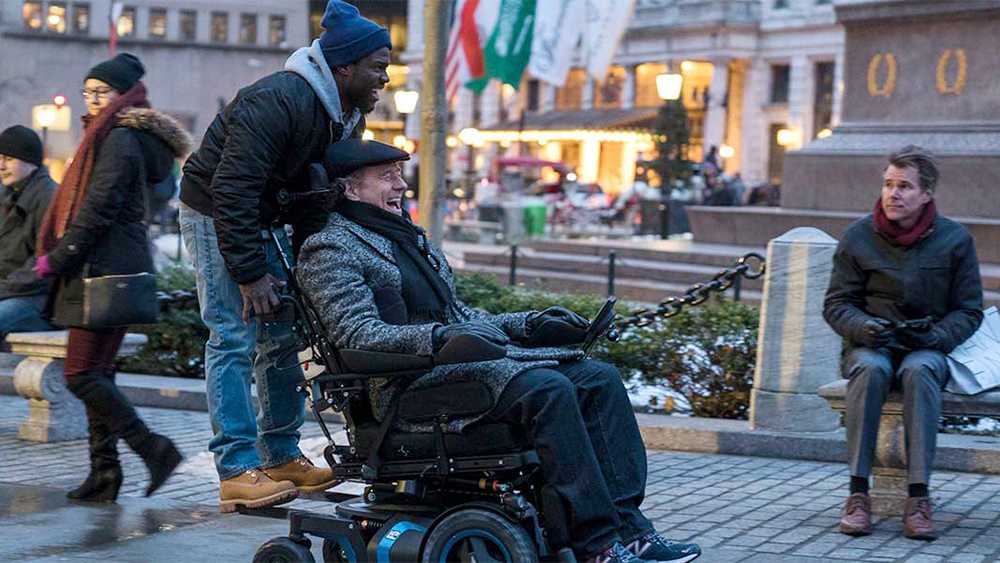Kevin Hart’s comedic skills and chemistry with Bryan Cranston creates a feel-good, laugh-out-loud drama that focuses on an unlikely friendship between two very different people.
“The Upside” had a lot to live up to because it is an adaptation of the 2011 French film, “The Intouchables.” It is based on a true story about the friendship between quadriplegic aristocrat Philippe Pozzo di Borgo and his Algerian attendant Abdel Sellou.
“The Upside” follows the plot of “The Intouchables” with Phillip Lacasse (Bryan Cranston), a wealthy white man from New York City who is paralyzed from the neck down due to a paragliding accident. A few years later, his wife, who is also his caretaker, dies from cancer. Shortly after, he begins the search for a live-in caregiver to assist him in his everyday life.
Dell Scott (Kevin Hart), a recent parolee trying to win back his ex-wife and estranged son, searches for a job to satisfy the requirements of his parole officer. Aiming to interview for a janitorial job in the basement of an apartment building, he takes the wrong elevator and barges into the penthouse where Phillip and his executive assistant are conducting interviews for a caregiver. Phillip is charmed by Dell’s brashness and offers him the job. Dell is skeptical, and at first, he only wants to get a signature to please his parole officer, but once he finds out how much the job pays and that it comes with the benefit of living in a luxurious penthouse, he accepts.
The movie centers around Phillip and Dell’s heartwarming relationship. They are men from vastly different socioeconomic statuses who broaden each other’s worldviews. The two share their personal passions and cultures, especially through their musical tastes. Phillip introduces Dell to opera while Dell acquaints Phillip with Aretha Franklin. Dell also introduces Phillip to marijuana, another piece of Dell’s lifestyle. Both men learn about what they’ve been missing in their lives — Dell finds passion and direction while Phillip rediscovers happiness despite his disability. It’s fun to watch Dell become interested in opera, and it’s hilarious to see Phillip order 14 hot dogs while high. However, the relationship between the two men is glaringly cliche. Dell fills the shoes of the directionless, paroled black man who shows the rich, depressed man the “true meaning in life.” He is a token, existing only to improve the lives of the white characters.
Despite Dell’s status as a cliche, it’s still amusing when he struggles with understanding how to care for a quadriplegic man. He struggles with everything, from remembering to buckle Phillip into the wheelchair to administering oxygen in the middle of the night. One of Hart’s funnier scenes occurs when his character tries to overcome his squeamishness to change Phillip’s catheter. In his personal life, Dell has never had responsibility for anyone besides himself. During his time serving in jail, Dell was unable to be emotionally reliable and there for his son and wife. Taking on the role of caretaker gives him a greater sense of purpose as he navigates the uncomfortably intimate reality of being another person’s physical and emotional lifeline. He develops as a character more than anyone else, and his growth — from directionless to conscientious — propels the film forward.
The lightheartedness that Hart brings to what could’ve been a much more dramatic film suits the movie well. Dell’s personal life and Phillip’s life as a quadriplegic are serious and depressing, but their relationship uplifts them both. Certain scenes are extremely powerful, like when Dell calls Phillip out on his bad attitude despite his lavish lifestyle. Vases and picture frames are smashed, and screams are let out, but after the dust settles, the two men emerge with a deeper understanding of each other and their frustrations.
Nicole Kidman plays Phillip’s uptight executive assistant Yvonne Pendleton. Her weak backstory offers no explicit explanation for why she sticks around working for Phillip, but it’s hinted that she’s in love with him and is too scared to make the first move. She barely exists outside of her relationships with the two male protagonists. In almost all of her scenes, she’s either showing her dislike for Dell or being awkward around Phillip. Despite her discreet love for him, Phillip forces her away during one of his depressive episodes, causing her to quit. The ending poorly satisfies the love subplot, simply showing the two reuniting in a quiet conversation a few months after her leaving. Not only is her character cliche, but she also faces many objectifying and uncomfortable comments from Dell, which are also directed at Phillip’s female physical therapist.
Hart’s and Cranston’s performances are touching and memorable, but the story is rather predictable and based in many stereotypes: the depressed billionaire, the uptight assistant, and the paroled and weed-smoking black man. It is all cliche, but the heartwarming relationship between the two men makes up for it.




















